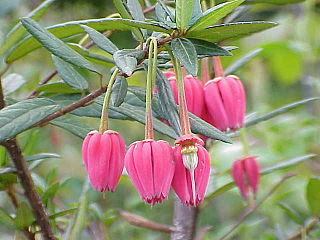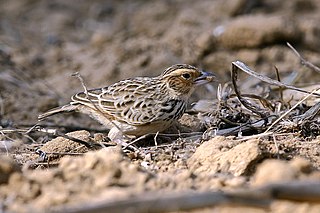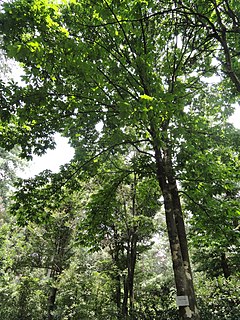
Garcinia is a genus of flowering plants in the family Clusiaceae native to Asia, America, Australia, tropical and southern Africa, and Polynesia. The number of species is disputed; the Kew Gardens recognise up to 400. Commonly, the plants in this genus are called saptrees, mangosteens, garcinias, or monkey fruit.

The Bengal bush lark or Bengal lark is a species of lark in the family Alaudidae found in southern Asia.

Camellia sinensis is a species of evergreen shrubs or small trees in the flowering plant family Theaceae whose leaves and leaf buds are used to produce tea. Common names include "tea plant", "tea shrub", and "tea tree".

Elaeaocarpaceae is a family of flowering plants. The family contains approximately 615 species of trees and shrubs in 12 genera. The largest genera are Elaeocarpus, with about 350 species, and Sloanea, with about 120.

Jerdon's bush lark or Jerdon's lark is a species of lark in the family Alaudidae found in south Asia. This was formerly considered as a subspecies of Mirafra assamica and termed as the Madras bushlark. Two other species in the complex include Mirafra marionae and Mirafra microptera. Jerdon's bush lark is typically very pale on the underside
Dalbergia balansae also known as Dalbergia assamica is a species of legume in the family Fabaceae. It is found in China and Vietnam. It is threatened by habitat loss.
Gleditsia assamica is a species of flowering plant in the pea family, Fabaceae, that is found only in India. It is threatened by habitat loss.
Amentotaxus assamica is a species of conifer in the family Taxaceae. It is found only in India. It is threatened by habitat loss.

The Indochinese bush lark or Indochinese lark is a species of lark in the family Alaudidae found in southeast Asia.

The red-winged lark is a species of lark in the family Alaudidae found in eastern Africa.

The Burmese bush lark or Burmese lark, is a species of lark in the family Alaudidae found in Southeast Asia.

Aesculus wangii is a species of tree in the family Sapindaceae, found in southern China (Yunnan) and northern Vietnam. It is threatened by habitat loss. Sometimes considered conspecific with Aesculus assamica.
Sloanea acutiflora is a species of plant in the Elaeocarpaceae family. It is endemic to Suriname.

Sloanea is a genus of flowering plants in the family Elaeocarpaceae, comprising about 150 species.
Sloanea gracilis is a species of plant in the Elaeocarpaceae family. It is endemic to Suriname.
Sloanea lepida is a species of plant in the Elaeocarpaceae family. It is endemic to New Caledonia.
Sloanea shankii is a species of plant in the Elaeocarpaceae family. It is endemic to Honduras.
Sloanea suaveolens is a species of plant in the Elaeocarpaceae family. It is endemic to New Caledonia.
Sloanea tomentosa is a species of plant in the Elaeocarpaceae family. It is found in Bhutan, China, India, Myanmar, Nepal, and Thailand.

Camellia taliensis is a species of evergreen shrub or small tree whose leaves and leaf buds are used to produce tea.











